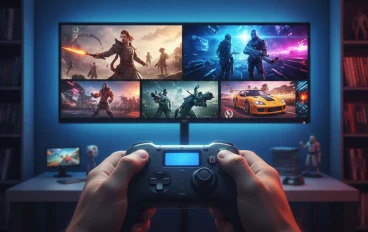
Benefits of electronic games
الألعاب وأثرها في العملية التعليمية
Games are no longer merely a means of entertainment or passing the time, as they were once viewed. In recent years, they have transformed into a valuable educational tool. Technological advancements and the proliferation of smart devices and computers have made it easier to integrate game elements into the educational process, making learning fun and interactive. Numerous studies have proven that students retain information better when they learn it through an engaging, hands-on activity, compared to memorizing it through traditional rote learning
Games as a Means of Increasing Motivation
One of the most prominent features of educational games is their ability to stimulate student motivation. When they participate in a game that includes challenges, questions, and prizes, they feel excited and focused, making them more prepared to learn. For example, a teacher can use a game based on points and levels to motivate students to participate and answer questions, transforming the class from a routine activity into a lively experience.
Enhancing Critical Thinking and Problem Solving
Games help train students in critical thinking and the ability to find innovative solutions to problems. In many games, students are confronted with complex situations that require them to make informed decisions. These experiences develop analytical and planning skills, making them more capable of facing difficult situations in their daily lives. Continuous repetition of such activities also enhances quick thinking and mental flexibility.
Games and Teamwork
Another equally important aspect is the role of games in developing cooperation among students. Games played in groups encourage communication and the exchange of ideas, and teach students the skill of listening to others and respecting their opinions. In addition, the positive competitive spirit that games foster among groups encourages each student to strive to present the best of their knowledge and skills, which raises the overall standard of the classroom.
Personal and Behavioral Aspects
The benefits of games are not limited to academics alone; they extend to building a student's character. They teach patience when facing difficulties, motivate them to persevere to achieve their goals, and build self-confidence when they win or advance in the game. Some games that simulate real-life situations also help instill moral values such as cooperation, honesty, and adherence to rules.
Technology and Digital Educational Games
With the development of digital technology, electronic educational games have emerged covering various fields, from language learning to mathematics and natural sciences. These games combine audio, video, and direct interaction, making the educational experience richer. Recognizing the importance of keeping pace with modern teaching methods, some schools have begun to rely on digital applications and games as part of their curricula.
Balance between Play and Education
Despite the numerous benefits of educational games, it is essential that their use be within considered limits. Over-reliance on games may diminish the importance of traditional, indispensable methods. Balance is the ideal solution; games are used as a complementary tool that supports learning and increases its effectiveness, without eliminating the essential roles of direct instruction and academic training.
Conclusion
Integrating games into education is not just a trendy trend; it is a necessity imposed by the nature of the new generation, accustomed to technology and digital interaction. Games can make the learning process more engaging, while simultaneously contributing to building students' character and honing their life skills. Therefore, investing in the development of educational games and their use in educational institutions is a strategic step toward more effective and creative education.
































